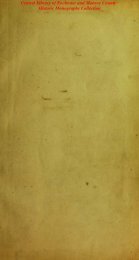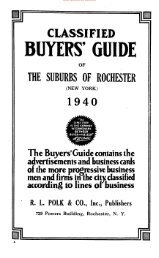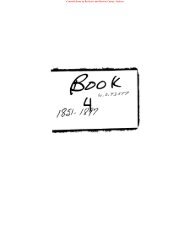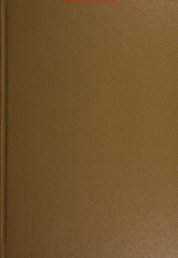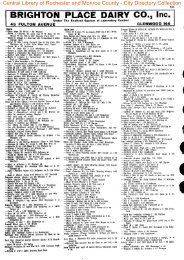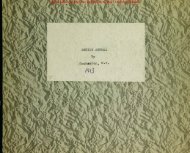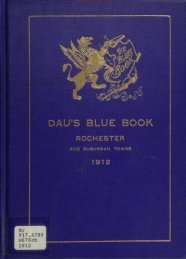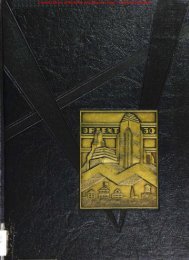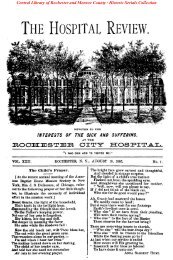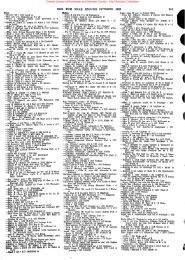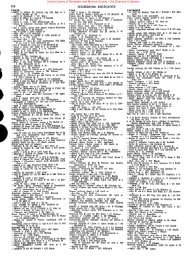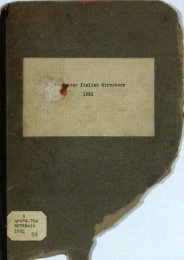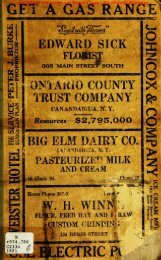The Farm Journal Illustrated Rural Directory of Monroe County, New ...
The Farm Journal Illustrated Rural Directory of Monroe County, New ...
The Farm Journal Illustrated Rural Directory of Monroe County, New ...
Create successful ePaper yourself
Turn your PDF publications into a flip-book with our unique Google optimized e-Paper software.
Central Library <strong>of</strong> Rochester and <strong>Monroe</strong> <strong>County</strong> · <strong>County</strong> Directories Collection<br />
CLASSIFIED BUSINESS DIRECTORY<br />
<strong>of</strong> turpentine, and hold them in place<br />
under the body with dry blankets, or<br />
rub the abdomen with stimulants or<br />
mustard water. If cramp is due to irritation<br />
in the bowels, a cure is not complete<br />
until a physic <strong>of</strong> aloes, one ounce;<br />
or linseed oil, one pint, is given. Soapy<br />
or salt water aids the cure when used<br />
as an injection.<br />
Couc, WIND.—Is caused by feeding<br />
after a long fasting, or when the animal<br />
is exhausted by driving, or by new grain<br />
or hay, too much grain fed, or by sour<br />
or indigestible food. <strong>The</strong> horse seems<br />
dull, paws, and the pains are continuous.<br />
<strong>The</strong> belly enlarges, and when struck in<br />
front <strong>of</strong> the haunches sounds like a<br />
dram. If not soon relieved, difficult<br />
breathing, sweating, staggering and death<br />
follow. Give alkalines to neutralize the<br />
gases formed. No simple remedy is<br />
better than common baking soda, two<br />
to four ounces. If this fails, give<br />
chloride <strong>of</strong> lime in half-ounce doses, or<br />
the same quantity <strong>of</strong> carbonate <strong>of</strong> ammonia<br />
dissolved and diluted with oil or<br />
milk, until relieved. Chloral hydrate is<br />
particularly useful in both wind and<br />
spasmodic colic Horsemen would be<br />
wise to keep it ready for emergencies.<br />
Physic should be given in flatulent colic,<br />
and turpentine, one to two ounces, with<br />
Unseed oil, eight ounces, frequently, to<br />
stimulate the motion <strong>of</strong> the bowels.<br />
Colic should not be neglected nor the<br />
patient left, until you are certain <strong>of</strong> cure<br />
or death.<br />
COUGH.—If a horse coughs, dampen<br />
his hay, wet his mixed feed, keep him<br />
out <strong>of</strong> a draught; after exercise blanket<br />
him. (See Heaves.)<br />
CRIBBING OR WIND-SUCKING.—This is<br />
a bad habit, rather than a disease. <strong>The</strong><br />
horse bites his manger or other convenient<br />
object, sucks air and makes a<br />
peculiar grunting noise. Prevention<br />
aids a cure. Iron mangers and stable<br />
fittings are a great help; or box stalls<br />
containing no projecting wooden objects.<br />
CURB.—A curved, unnatural condition<br />
<strong>of</strong> the back part <strong>of</strong> the hock. Lameness,<br />
enlargement and more or less inflammation<br />
are symptoms. Liniments, iodine<br />
ointment, blisters, and, as a last resort,<br />
firing, are all recommended.<br />
DISTEMPER.—Keep hot poultices <strong>of</strong><br />
bread and milk or oil meal on the neck<br />
<strong>of</strong> horses with throat distemper; change<br />
them <strong>of</strong>ten. In severe cases, rub the<br />
glands and muscles with spirits <strong>of</strong> turpentine<br />
and camphor. (See Choking<br />
Distemper.)<br />
389<br />
DYSENTERY.—If thb trouble exists,<br />
place the- horse in a dry, well-ventilated<br />
stable, rub the surface <strong>of</strong> the body frequently,<br />
and keep it and the legs warm<br />
with blankets and bandages. <strong>The</strong> food<br />
must be light and easy to digest, the<br />
water pure and in small quantities. Give<br />
first, castor oil, one-half pint, and<br />
laudanum, two ounces. <strong>The</strong> strength<br />
must be kept up by milk punches, eggs,<br />
beef tea, oatmeal gruel, etc<br />
EYE. —See Hooks, Pink-Eye and<br />
Blindness.<br />
FARCY.—A form <strong>of</strong> glanders which attacks<br />
the skin. (See Glanders.)<br />
FETLOCK.—If this be sprained and the<br />
injury slight, bandage and apply cold<br />
water frequently. Where the lameness<br />
is intense, and the swelling and heat<br />
great, the leg should be kept in a constant<br />
stream <strong>of</strong> cold water. When the<br />
inflammation has been subdued, the joint<br />
should be blistered. (See Knuckling.)<br />
FITS.—See Staggers.<br />
FOUNDER.—<strong>The</strong> front feet are usually<br />
affected, the delicate laminae being inflamed.<br />
Acute founder, if not cured, develops<br />
into chronic founder, and no sure<br />
cure is known for the latter stage <strong>of</strong><br />
the disease. <strong>The</strong> trouble may come from<br />
any one <strong>of</strong> several causes: Long or<br />
hard driving, hard pavements or roads,<br />
feeding or watering a horse while he<br />
is exceedingly warm or tired, etc., etc.<br />
Lameness, pain and heat in the fore feet,<br />
are common symptoms. For an attack<br />
<strong>of</strong> this kind, the best things to do are<br />
about as follows: Get the shoes <strong>of</strong>f,<br />
put the horse in his stall, and soak or<br />
pack his feet in cold water, moss, or<br />
whatever is handy; give a tablespoonful<br />
<strong>of</strong> saltpeter as a drench three times a<br />
day; send for a veterinarian.<br />
GALLS.—See Shoulder and Wind Galls.<br />
GIDDINESS.—A horse which is frequently<br />
or occasionally overtaken with<br />
this trouble is dangerous to use. It is<br />
hard to cure. It indicates the need <strong>of</strong><br />
moderate driving, especially in hot<br />
weather, and that a small amount <strong>of</strong><br />
hay should be fed.<br />
GLANDERS.—Whenever a horse is seen<br />
to bleed or emit <strong>of</strong>fensive matter from<br />
the nostrils, glanders may be suspected<br />
and home treatment should not be attempted.<br />
It may be a dangerous case,<br />
which is fatal alike to man and beast.<br />
A veterinary surgeon should be called.<br />
GORGED STOMACH.—This results when<br />
a horse has been fed after a long fast.<br />
<strong>The</strong> small stomach <strong>of</strong> a horse is so dis-



